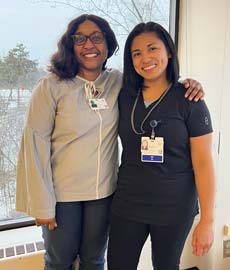Ontario Health Boosts Nursing Workforce with Supervised Practice Experience Partnership Program

Ontario Health is committed to finding solutions that build capacity and enhance the health care system across the province. One of the innovative approaches to doing that is through the Supervised Practice Experience Partnership (SPEP). Since its inception in 2022, more than 5,500 internationally educated nurses have completed the program and obtained their license to practice in Ontario. With almost 800 CNO-approved employers across the province, this initiative is making a significant impact at a patient level, enhancing nursing staff and providing substantial benefits to the health care system.
“By leveraging our extensive pipeline and collaborating with the College of Nurses of Ontario, we are not only promoting the integration of internationally educated nurses but also ensuring that our health care facilities benefit from a diverse and skilled nursing workforce,” said Judy Linton, Executive Vice President, Acute and Hospital-Based Care, and Chief Nursing Executive at Ontario Health. “This initiative means more nurses are ready to support patient care and continue to build capacity across all our regions.”
SPEP Integration at The Ottawa Hospital
Dr. Ndolo Njie-Mokonya, RN PhD, has been coordinating the SPEP groups program at The Ottawa Hospital for years, acting as the liaison between Ontario Health and the hospital, and overseeing the SPEP hiring needs for the organization.
“The SPEP program has been a great means to integrate diverse of nurses with different cultures and ethnicity,” said Dr. Njie-Mokonya, who highlights the broad representation of nurses that the SPEP program has brought to The Ottawa Hospital (TOH), one of the SPEP employers.
“We’ve had SPEP candidate representation from the Middle East, Asia, South America, the United Kingdom and Africa. It’s been a great blend of nurses from different ethnicities enriching TOH’s body of nurse professionals,” Dr. Njie-Mokonya explains. She also noted that the diversity has been a learning experience for Canadian-trained preceptor nurses at TOH, broadening their understanding of international nursing practices and the complexities of supporting different learner groups. She explained that the program has also meant more opportunities for IENs looking to enter a professional nursing role in Ontario.
Career Growth and Professional Development
“Through the SPEP program, our own IEN staff who may have been in unregulated roles have been able to upscale into the professional nurse role. Supporting that career growth for our own in-house staff has been a pleasure,” said Dr. Njie-Mokonya.
This career growth allows these staff members to stay in their units of work and eventually transition into their specialties of interest.
According to Dr. Njie-Mokonya, the SPEP program has significantly contributed to nurse recruitment and retention at TOH. The hospital has been able to fill vacant nursing positions on several units through the program, retaining some excellent nurses who are now mentoring new SPEP candidates. The integration of SPEP nurses has had a positive impact on hospital operations, particularly in nurse recruitment and filling position vacancies.
“Having a designated SPEP coordinator role has been a huge facilitator for our program. The candidates have a designated person they can ask questions without fear of judgment,” Dr. Njie-Mokonya noted.
Personal & Professional Success
As an IEN from the Philippines, for Aprilline Mae Golocan, joining the workforce as a registered nurse was a long-held goal.
“Since I came to Canada, I started out as a community-based personal support worker for a year in Montreal, then passed the exam to practice as a registered practical nurse. Eventually, I obtained my RN license through the SPEP program, which allowed me to meet the CNO’s requirement for Evidence of Practice,” Aprilline explained. Completing the required practice hours at the hospital’s rehabilitation centre under the supervision of a skilled preceptor, she gained confidence, refreshed her nursing skills, and enhanced her clinical judgment. The SPEP program provided Aprilline with the opportunity to join The Ottawa Hospital team, fulfilling her career goal.
“The best opportunity SPEP has given me was being able to set my foot at the door of The Ottawa Hospital and eventually joining the team at Ward B of the Rehab Centre,” she shared. “The most rewarding aspect of being a part of the SPEP program is, first, the opportunity to achieve my career goal within a specific timeline. Second, to reflect on the kind of nurse that I really want to be.”
The program has not only helped Aprilline transition into the nursing profession in Canada but also allowed her to contribute meaningfully to patient care and health care in Ontario.
Last Updated: December 04, 2025
